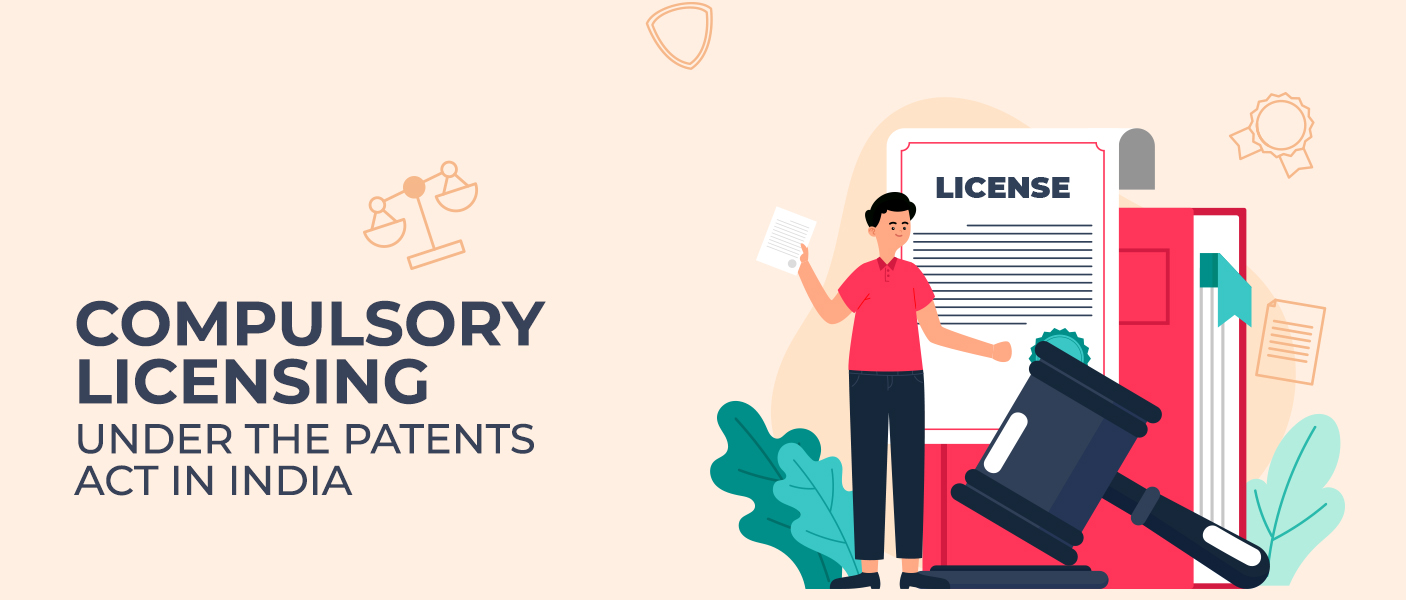Compulsory Licensing Under The Patents Act in India
May 15, 2024 By Khyati DaveIntellectual Property Rights (IPRs) have always been a cornerstone of innovation and economic growth, providing creators and inventors the exclusive rights to benefit from their inventions. However, the need to balance these rights with public welfare has led to the introduction of mechanisms like compulsory licensing, especially under the Patents Act in India.
This blog delves into the concept of compulsory licensing within the framework of Indian IP laws, examining its implications and applications.
Understanding Compulsory Licensing
Compulsory licensing is a provision under patent law that allows the government to authorize a third party to produce and sell a patented product or process without the consent of the patent holder. This mechanism is typically invoked to address public health needs, ensure the availability of essential drugs, or in cases where the patented invention is not available to the public at a reasonable price.
The Patents Act in India
The Patents Act of 1970, as amended, governs the legal framework for patents in India. One of its significant provisions is the inclusion of compulsory licensing, which is detailed under Sections 84 to 92. These sections outline the grounds,conditions, and procedure under which compulsory licenses can be issued. The primary objective is to balance the monopoly granted by a patent with the larger public interest.
Grounds and Conditions for Compulsory Licensing
According to Section 84 of the Patents Act in India, any person can request a compulsory license after three years from the date of grant of a patent on the following grounds:
- The reasonable requirements of the public with respect to the patented invention have not been satisfied.
- The patented invention is not available to the public at a reasonably affordable price.
- The patented invention is not worked in the territory of India.
According to section 146(2), both patentees and licensees are required to provide statements about the extent to which the patented invention has been commercially implemented in India. Failure to submit this information by the patentee can be used as evidence to support a claim for compulsory licensing by the person applying for such a license.
In addition, Section 92 provides for the issuance of compulsory licenses in circumstances of national emergency, extreme urgency, or public non-commercial use.
Procedure for Obtaining a Compulsory License
The process of obtaining a compulsory license involves filing an application with the Controller General of Patents, Designs, and Trademarks on the prescribed Form-17 in a prescribed manner along with the prescribed fees. The applicant must present evidence to support the grounds mentioned above. The Controller evaluates the application, considering factors like the nature of the invention, the ability of the applicant to work the invention to the public advantage, and the time elapsed since the grant of the patent.
If the Controller is satisfied that the grounds for compulsory licensing are met, a license is granted, specifying the terms and conditions, including the royalty payable to the patent holder.
Case Study: Natco Pharma and Bayer Corporation
A landmark case in the history of Indian IP laws is the issuance of a compulsory license to Natco Pharma for the cancer drug Nexavar, patented by Bayer Corporation. In 2011, Natco Pharma applied for a compulsory license, arguing that Bayer’s drug was not available to the public at an affordable price.
The Controller General of Patents granted the license, highlighting that the drug was excessively priced and out of reach for most patients. This case underscored the balance between patent rights and public health, reinforcing the role of compulsory licensing in making life-saving drugs accessible.
Compulsory Licensing in the Context of IP Laws and International Agreements, India’s compulsory licensing provisions align with the flexibilities provided under the TRIPS Agreement (Trade-Related Aspects of Intellectual Property Rights) of the World Trade Organization (WTO). Article 31 of the TRIPS Agreement permits member countries to grant compulsory licenses under specific conditions, ensuring that patents do not become a barrier to accessing essential medicines and technologies.
However, the implementation of compulsory licensing must navigate the complexities of international trade relations and IP laws. While it serves as a tool for public welfare, it can also lead to tensions with patent-holding companies and their home countries, which often view such licenses as undermining the rights granted by patents.
The Role of Legal Firms
In the landscape of intellectual property rights in India, legal firms such as Parker And Parker Co. LLP plays a crucial role. These firms provide expert guidance on navigating the complexities of IP laws, including the strategic use of compulsory licensing. They assist both patent holders in protecting their interests and applicants seeking compulsory licenses to ensure that public needs are met.
Parker And Parker Co. LLP, with its extensive expertise in IP laws, offers invaluable services in handling disputes related to compulsory licensing, advising on compliance with the Patents Act, and representing clients in negotiations and litigations. Their role is pivotal in maintaining the delicate balance between protecting intellectual property rights and addressing public welfare concerns.
Compulsory licensing under the Patents Act in India is a critical tool for ensuring that the benefits of patented inventions are accessible to the public, especially in sectors like healthcare. While it challenges the conventional notion of patent exclusivity, it is a necessary measure to address the socio-economic realities of India. By integrating compulsory licensing into its IP laws, India exemplifies a commitment to balancing innovation with public interest.
Legal firms such as Parker And Parker Co. LLP are known for providing the expertise and support needed to navigate the complexities of compulsory licensing. As India continues to evolve its intellectual property regime, compulsory licensing will remain a significant aspect of ensuring equitable access to essential technologies and medicines.





